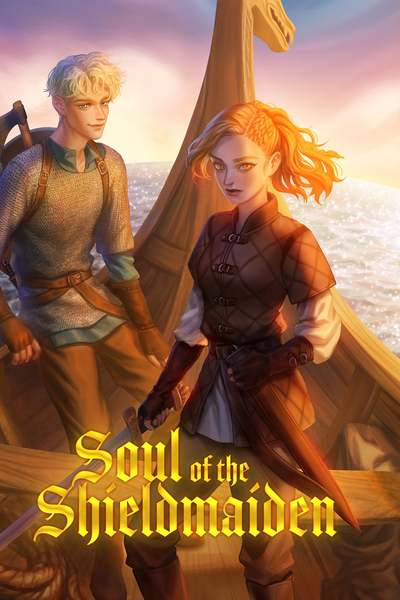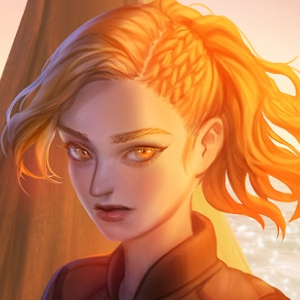I’d watched men from Strongricstead go out in their fishing boats. Those were small affairs, not meant to travel over the horizon.
By the time morning came, I saw nothing but the sea surrounding the longship. Someone had thrown a woolen blanket over me as I slept in the night, but half-soaked from the spray of the ocean, it did little to shelter me from the morning chill.
Next to me, Aethelhun knelt with his head over the gunwale, retching and dry-heaving at the sea. Ecgmund looked nervously around the ship, and Gilda simply sat with her back to the mast and her hands wrapped about her knees.
I still felt nothing from the raid.
Perhaps it is good that my child’s mind simply did not allow me to grapple with the horrors that had befallen me. My mind didn’t dwell on the fate of my family, my friends. Where Gilda and Ecgmund had been paralyzed by their fear of these Norsemen who had come a-viking, I refused to acknowledge what had happened.
The memories of my family, of Strongricstead, a part of me just packed up and put away, precious things that dare not be risked by bringing them into contact with the world. I didn’t intend to do it. I didn’t try to do it. It simply happened. Instead of dwelling on terror. My child’s mind sought distraction.
And found it in the rolling motion of the longship.
At sea, no men strained at the oars. No drumbeat sounded. Instead, a blue-and-white striped sail billowed in the wind, pulling us onwards, though with no land in sight I had no way to know to where.
As the days passed, I lived both miserable and joyous at once. The cold wind off the North Sea pummeled me, and the Norsemen did not allow their prisoners within the small tent they’d erected towards the stern of the boat. They fed us dried fish and stale bread, which I ate down greedily.
Aethelhun could not keep any of it down, and began to fall ill. Ecgmund tried to encourage him to eat, to be well, but Aethelhun’s big blacksmith’s muscles had already begun to slacken and his face had begun to pale.
All of these things made me miserable.
But the sea itself—the sea I’d oft snuck out of my home to visit even when Papa forbade it—danced and played with me. She became my nursemaid and my dance partner, rolling the ship under me just for my own delight. I made a game of it, standing atop a seat as the longship pitched and dipped under me, and giggled as I rode the seat’s undulations.
“Aelfwyn! Get down from there!” Gilda snapped at me. “Christ above, you’ll be thrown overboard!”
I thought Gilda quite silly for that. The sea was my friend—to think she’d do something so ill-mannered I found insulting. So, I did the sensible thing and stuck my tongue out at Gilda in the time-honored tradition of offended children. Gilda was not Mama. She didn’t get to talk to me like that.
The Norsemen had turned to look at me with Gilda’s shout. They cheered me as I put my tongue out at her. I knew they couldn’t speak our tongue any more than I spoke theirs. But her tone had been unmistakable, and my gesture spoke my thoughts very plainly without the need for words.
A few days later, they threw Aethelhun overboard.
By that time, he’d stopped vomiting. He’d also stopped eating or drinking. He’d simply laid in the ship, his lips moving in a silent speech. I didn’t know whether he spoke to someone that wasn’t there, or simply prayed, but he did not move otherwise.
He didn’t even yell as the Norseman said something in that rough, guttural tongue, then kicked him in the side.
So the Norseman shook his head, sighed, and without pause scooped up the big smith’s apprentice and tossed him overboard. Gilda shouted in wordless protest. Ecgmund grabbed at the Norseman’s arm, but failed to even slow the big man.
The Norsemen did not celebrate their kill. That was nice, at least. The big men appeared upset to have to do it, like culling a lamb that can’t take the milk.
I watched it silently. Then Aethelhun slid into that portion of my mind alongside the other things it didn’t want to think about.
I went back to playing my games with the sea.
***
Eventually, land appeared looming on the horizon once more. The craggy cliffs parted before us, allowing the sea, and our ship, into a winding passage between them, a wide, flat plain of water the likes of which I’d never seen. On all sides, the land rose up to look over this sea-bottomed valley.
Then I saw the village. It didn’t look so different than my own; the rooves of the buildings were made more with turf than thatch, and a long pier jutted out into the water. Tied to it floated boats and ships of different lengths. Each showed that same sweeping pattern of overlaid boards. To me, they all seemed waiting to venture out for their own dance atop the water.
I couldn’t help but wonder what magic had brought us here. The sea had offered no landmarks, no way of pointing the ship where to go. Yet here we were, sailing up to a village nestled into the mountains and along a little strip of water laid out before it, like the sea rolling out a carpet for its visitors.
People began to pour from the village towards the pier. Children first, their faces beaming smiles. I smiled back, and waved, not knowing better…the old, scar-faced Norseman put my hand down and shook his head at me. Behind the children came the rest of the village. Adults, mostly women, crowded the shore near the pier in celebration of the return of their loved ones. And their new possessions. Like me.











Comments (0)
See all